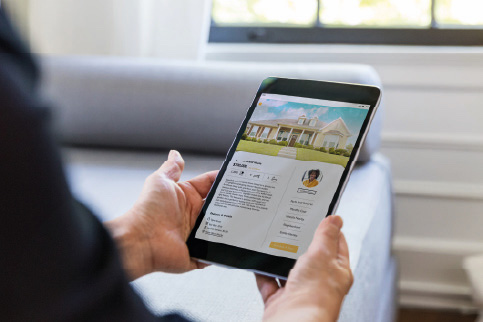

Anytime you’re buying or selling a home, there’s a lot of paperwork involved, and you may hear terms that you weren’t previously familiar with. One term you may frequently hear thrown around is a conveyance. It’s important to note that conveyance in the U.S. is a much simpler process than in the U.K., where the term is more commonly used.
Conveyance is the transfer of property ownership from one party to another. This article will explain how conveyance in real estate works and everything you need to know as you start the home buying process.
Conveyance is the transfer of ownership of real property between a seller (also known as the conveyor) and a buyer (the conveyee). This process is done using an instrument of conveyance, usually a deed, lease or contract. This document transfers the legal title to the new owner and finalizes the lien on the property.
Get approved to see what you qualify for.
If you’re just starting the process of buying a home, it’s important to understand how conveyance works. Conveyance legally documents that the seller has transferred property ownership to the buyer.
This documentation means that if one party breaks the contract used to transfer ownership, the other party can take them to court to enforce the conveyance. This is also why many home buyers are encouraged to purchase title insurance.
You may have to pay a conveyance tax or real estate transfer tax, depending on where you live. The tax largely depends on your local and state laws – for instance, Kansas, Mississippi and Missouri don’t charge a transfer tax.
There are two main types of conveyances: real estate and mineral rights. It’s a good idea to learn more about both kinds before starting the home buying process.
Several types of legal documents are used for conveyance in real estate transactions, but deeds are the most common ones used. Here are the most common type of deeds you can expect to see:
The term “mineral rights” refers to ownership of resources like oil, gold, copper and natural gas. If you own mineral rights, you can extract and sell these resources without needing to receive government authorization.
And if you decide to transfer these rights, you’ll need a mineral rights conveyance. The average reader won’t need to worry about this type of conveyance, but it can be helpful to know about it beforehand.
You can get a real, customizable mortgage solution based on your unique financial situation.
If you’re interested in learning more about conveyances and how they work, you might find the following questions and answers useful.
To transfer ownership of a property, both the buyer and the seller need to provide certain types of information to complete the conveyance. For instance, you’ll likely have to provide the following information:
You’ll also need to enlist a notary to notarize the signatures of both parties to make the conveyance complete.
While the details of property transfer can vary by location, here are the general steps you’ll take to complete the conveyance process and transfer ownership of the property:
A deed of conveyance is a legal document that proves that the deed (or title) was transferred from one property owner to another. That way, if a problem arises regarding ownership, there’s legal evidence that one party transferred ownership to another party.
This is similar to a sales deed, which is a contract establishing that the property was transferred to the buyer. It states that the sale was completed successfully, and that the purchaser now owns the property.
However, the main difference between the two deeds is that a sales deed is used when a sale takes place. In comparison, a conveyance deed can be used when the property is transferred as a gift, lease, mortgage or under other circumstances.
Mortgage conveyancing involves using a qualified professional to do the legal work of transferring property ownership. Using a qualified third party is easier for everyone involved and can be the best way to ensure it’s done correctly. This individual will research the property, look for any potential problems and complete all the paperwork.
Conveyance is the process of transferring property ownership from one party to another. This process is completed using a legal document, like a deed, lease or contract. Completing the conveyance process successfully protects the buyer if any issues arise regarding property ownership.
If you’re a first-time home buyer, there’s a lot to learn, and it’ll take time to familiarize yourself with the new terminology. It may be a good idea to read more about purchase agreements and how they work as a next step.
See recommended refinance options and customize them to fit your budget.












LMB Mortgage Services, Inc., (dba Quicken Loans), is not acting as a lender or broker. The information provided by you to Quicken Loans is not an application for a mortgage loan, nor is it used to pre-qualify you with any lender. If you are contacted by a lender or broker advertising within our network, your quoted rate may be higher depending on your property location, credit score, loan-to-value ratio, debt-to-income ratio, and/or other factors. Quicken Loans does not offer its matching services in all states. This loan may not be available for all credit types, and not all service providers in the Quicken Loans network offer this or other products with interest-only options. The information that we provide is from companies which Quicken Loans and its partners may receive compensation. This compensation may influence the selection, appearance, and order of appearance on this site. The information provided by Quicken Loans does not include all financial services companies or all of their available product and service offerings. Article content appears via license from original author or content owner, including Rocket Mortgage.
Note: Actions on this website are recorded for quality assurance or training purposes. Input of data constitutes consent.
Quicken Loans is a registered trademark of Rocket Mortgage, LLC, used under license by LMB Mortgage Services, Inc.
LMB Mortgage Services, Inc. | NMLS #167283
4859 W Slauson Ave #405 Los Angeles, CA 90056